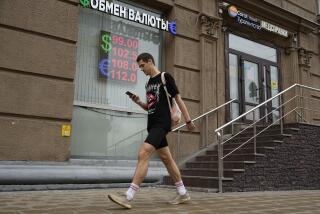A Waning Euro, a Waxing Price
- Share via
The euro, a common currency adopted by France, Germany, Italy, Spain and seven other European countries, has lost nearly a quarter of its value since it was introduced in January 1999. The slide worries central bankers and finance ministers across the Continent. Even the United States, no advocate of the euro, pitched in late last month to prop up the beleaguered currency.
The Danes rejected the euro in a referendum last Thursday, voting decisively to stay out of the European monetary union. Why then should we care? After all, the dollar stretches farther for U.S. travelers and European imports are made cheaper. True, but there is a price to pay for the growing disparity between the dollar and the euro, and the U.S. economy may pay a good chunk of it.
U.S. multinationals already are reporting that the weak euro is dragging down their profits, and the lower performance is sending shudders through stock markets.
Particularly vulnerable are companies selling to consumers, like McDonald’s and Gillette, and high-tech companies increasingly dependent on sales on the Continent.
The slumping euro is hurting U.S. exporters too. The farther the currency drops against the dollar the more expensive U.S. exports become and the less competitive they are. To no one’s surprise, U.S. exports to Europe fell sharply in July.
As the American economy shows signs of slowing down, U.S. companies will increasingly look for growth in Europe and Asia. But the weak euro is putting Europe’s growth in danger, and Asian economies, which have been hit hard by high oil prices, aren’t likely to become the engine of global growth any time soon.
The Europeans themselves will have to fix the euro, but it was right for U.S. Treasury Secretary Lawrence Summers and his Japanese and Canadian counterparts in the Group of Seven richest countries to lend a hand by intervening in the currency markets and expressing support for a stronger euro. It has been declining so long that the markets considered short selling--trading on the expectation the currency would fall even further. Now they might think twice. By helping the Europeans, Summers was helping the Americans as well.
More to Read
Inside the business of entertainment
The Wide Shot brings you news, analysis and insights on everything from streaming wars to production — and what it all means for the future.
You may occasionally receive promotional content from the Los Angeles Times.










